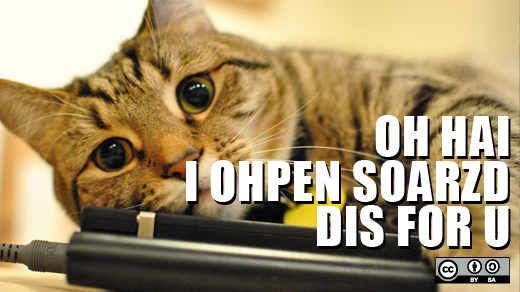"Even with the sacred printing press, we got erotic novels 150 years before we got scientific journals."
- Clay Shirky at TED Cannes in June 2010
This is one of my favorite quotes from one of my favorite people in the business, Clay Shirky. I particularly like it because it illustrates the period many organizations find themselves in when trying to integrate social media internally. Before wikis were used by the Intelligence Community to develop reports on IEDs, people were creating user badges to show off their favorite NFL teams. Before my own company's Intranet won any awards, we had people talking about how they enjoy skinny dipping on their profile. Before our VPs starting using Yammer to communicate with the workforce, we had groups of Android geeks and fitness gurus.I'm telling you this because if you're implementing any type of social media behind your organizational firewall, you should prepare yourself, your colleagues, your bosses, your senior leadership for this one inexorable truth.
If you will freak out when you see this on your Intranet, you're probably not ready for a social intranet
If you want to create a vibrant culture of collaboration, you need to be OK with pictures of LOLCats, posts about the NFL playoffs, arguments about Apple and Android, and criticism of company policies.
Accept and embrace this fact now and your communities have a much better chance at succeeding. Or, continue thinking that things like this are a waste of a time and are unprofessional, and get ready to pay a lot of money for a system that ultimately no one uses unless they absolutely have to.
Unfortunately, "social" seems to have become almost a dirty word in the workplace, conjuring up images of employees whittling away their time on Facebook, talking to their boyfriend on the phone, or taking a three hour lunch break. Let's all agree now to stop trying to take the social out of social media. "Social" interactions not only needs to be OK, they need to be encouraged and rewarded. Shirky explains why at the 5:33 mark of the below TED video.
Shirky says:
The gap is between doing anything and doing nothing. And someone who makes a LOLcat has already crossed over that gap. Now it’s tempting to want to get the Ushahidis without the LOLcats, right, to get the serious stuff without the throwaway stuff. But media abundance never works that way. Freedom to experiment means freedom to experiment with anything.
The same principle holds true when talking about social media and the business world. There's this tendency on the part of senior leadership to want to skip the blogs about company policy workarounds and the wiki pages detailing where to get the best burritos near the office and move right to co-creating methodologies with cross-functional teams and crowdsourcing initiatives that save millions of dollars. It doesn't work like that. Collaborative communities don't just start innovating because you build a website and send a memo. Just like we had to experience erotic novels before scientific journals and LOLCats before sites like Ushahidi, we will also have to accept the fact that your employees will be talking about fantasy football and what they're doing over the holidays before they're going to be ready to use those tools to conduct "real" work.
This makes intuitive sense though, doesn't it? Isn't posting about fantasy football or your favorite lunch spot a lot easier (and less frightening) than uploading that report you've been working on for three weeks? If someone doesn't like your favorite restaurant, who cares? If, however, someone criticizes the report you've spent weeks writing, that's a little more intimidating. Once you've taken that step – that step from doing nothing to doing something - it's a lot easier to take the next step and the step after that. After engaging in that conversation about your favorite burrito, it's suddenly easier to join the conversation about the new IT policy. Then, maybe you upload a portion of the report you're struggling with to see if anyone can help. Viewed from this perspective, even the stupidest posts and most worthless conversations have value, because they provide a safe, low risk means for people to dip their toe in the water and take that first step.
It takes time for employees to feel comfortable using these social tools at work. If you give them the ability to grow and learn together at their own pace, your community will become much more scalable and sustainable.
So embrace the LOLCats, the fantasy football threads, the lunch discussions, and the custom avatars – at least your employees will be creating and sharing something with someone else. Because what will follow is that these stupid, silly, foolish discussions will lead to relationships, questions, answers, and finally, very cool innovations, products, and solutions that will save you money, win you awards, and really and truly create a social business.





1 Comment